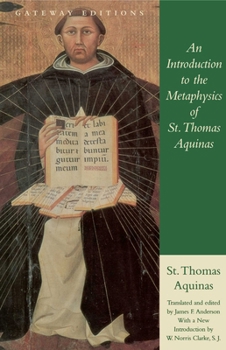An Introduction to the Metaphysics of St. Thomas Aquinas
Select Format
Select Condition 
Book Overview
An Introduction to the Metaphysics of St. Thomas Aquinas is an accessible Aquinas and a solid entry into his work. The format is manageable, and the scope, appropriately limited. James F. Anderson's skillful collection and lucid translation makes the pleasure of reading Aquinas available as it has not been before.
Format:Paperback
Language:English
ISBN:089526420X
ISBN13:9780895264206
Release Date:June 1997
Publisher:Gateway Editions
Length:116 Pages
Weight:0.42 lbs.
Dimensions:0.3" x 5.4" x 8.3"
Customer Reviews
5 ratings
A Good explanation of Thomistic Metaphysics
Published by Thriftbooks.com User , 15 years ago
It would be very difficult to be critical in a review such as this since I would be being critical of the work of Aquinas. We have in this volume a good look at the basic foundation of the metaphysics of Aquinas. Difficult to understand? Yes. That shouldn't surprise us however. This is a culture far removed from ours where intellectual thought was taken far more seriously and Aquinas wrote assuming the basics were understood. The fault does not lie with Aquinas on being difficult. The fault lies with us in being simple. I recommend this book as I would recommend getting familiar with all the great thinkers one can and sadly in our day and age, Christian thinkers are usually disregarded. Let it not be so. Truth is always relevant and that would include the arguments of Aquinas. Even if we disagree with him on some areas, we can certainly learn from his way of thinking. (And I am not necessarily asserting disagreement either.)
The One and the many, and the analogicity of Being:
Published by Thriftbooks.com User , 22 years ago
Essence and existence. Aquinas develops Aristotelian metaphysics, the "transcendental" science of being (note that the term 'transcendental' as used by Thomas is quite different than the same term as used by Kant). Thomas' thought is among the densest of all philosophers', and is, for the modern student, perhaps more difficult to grasp than is the work of Kant. A reader unfamiliar with philosophy should not initiate his study with Thomas. For the student [at least] somewhat grounded in existentialist reasoning, this compilation serves as a concise introduction to Thomist metaphysics/ natural theology/ first philosophy. Translated and compiled by professor of philosophy, James F. Anderson, this volume is especially valuable in that Thomas Aquinas' work is so capacious and intimidating that one doesn't otherwise know how to approach it.Thomas [and Averroes] reintroduced Aristotle to Western thought and Thomist scholasticism has illuminated the path from the 13th century to the 20th, he was perhaps the greatest intellect of the Middle Ages. Anderson's edition may be the best means of introducing oneself to St. Thomas Aquinas.
A deep introduction to Aquinas's metaphysical synthesis
Published by Thriftbooks.com User , 22 years ago
This book harvests Aquinas's finest, clearest and most relevant metaphysical texts--particularly those that better elucidate his original philosophical synthesis--with a focus on three problems: the subject of metaphysics, the analogicity of being, and the most universal determinations of this notion: the "transcendentals."Do not expect a comprehensive exposition of Aquinas's metaphysical thought, for this was clearly not the intent of the late James F. Anderson. In fact, the book does not introduce us to certain basic metaphysical notions such as substance, accident, prime matter and substantial form. For this reason, some knowledge of classical metaphysics is highly desirable, while not absolutely necessary, to benefit more fully from this outstanding compilation.The selection is of tremendous educational value, especially if we consider that some of the incorporated texts are difficult to find in translation. Excellent for teachers and students alike.In brief (in just 116 pages), this book reveals some of Aquinas's greatest contributions to classical, perennial "first philosophy." The result is a well-organized, fluent introduction to Aquinas's own thoughts in Aquinas's own words.
An excellent introduction to the metaphysics of St. Thomas
Published by Thriftbooks.com User , 23 years ago
First, I will simply reiterate what the previous reviewer stated: "The author introduces the reader to the metaphysics of St. Thomas by compiling sources from disparate primary texts." Apparently, no single primary source for Thomas' metaphysics exists. The author has done us a tremendous service in bringing Aquinas' metaphysical teachings together in one volume.This book also represents a great introduction to metaphysics in general, at least for a person who is trying to teach himself philosophy, such as myself.I have found other compilations of Thomas' writings to be difficult to understand because they assume an understanding of the transcendentals: being, one, true, good and beautiful and their relationships to each other; and other philosophical terms such as act, potency, form and matter, substance and essence, etc.In around 100 pages the author is able to convey the central concepts of Thomas' metaphysics very clearly, thus opening the way for further study in Thomas' writings.I am very grateful to have discovered this book. I am sure you will be too.
Reliable introduction in Thomas's own words
Published by Thriftbooks.com User , 25 years ago
The author introduces the reader to the metaphysics of St. Thomas by compiling sources from disparate primary texts. A wealth of citations in Thomas's own words results. The many works of Thomas are lengthy, often difficult to access and too expensive to own. The author has overcome this barrier, at least in terms of an adequate introduction. Citations are arranged in chapters such as "What is metaphysics, Modes of Being, The Analogy of Being," and the trandendentals, oneness, goodness, truth, and beauty.





